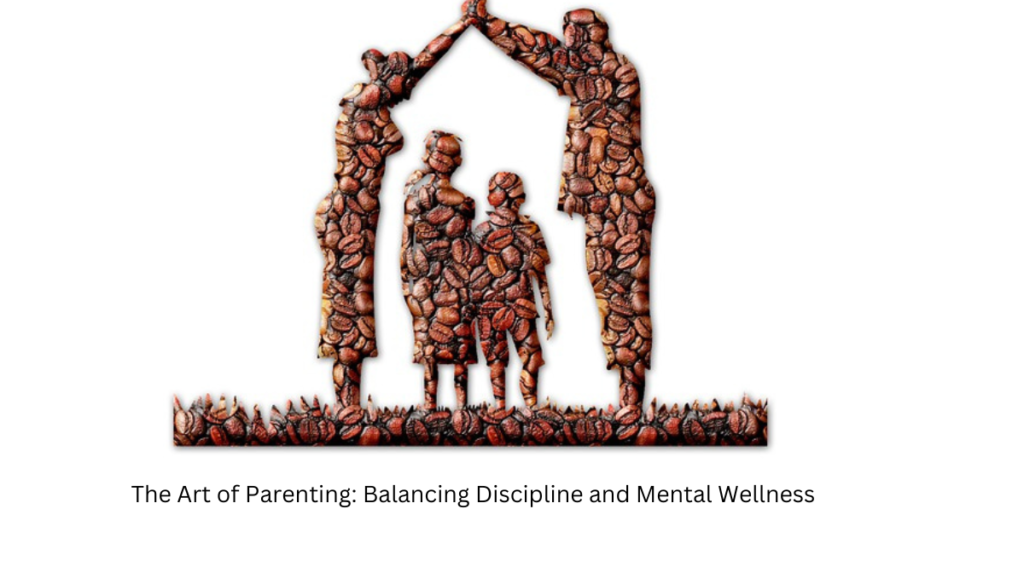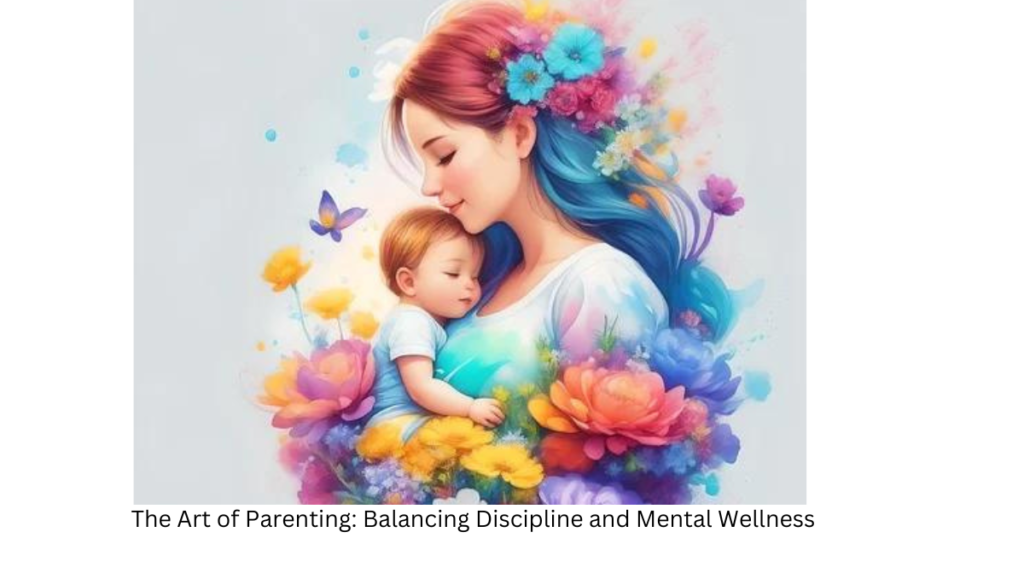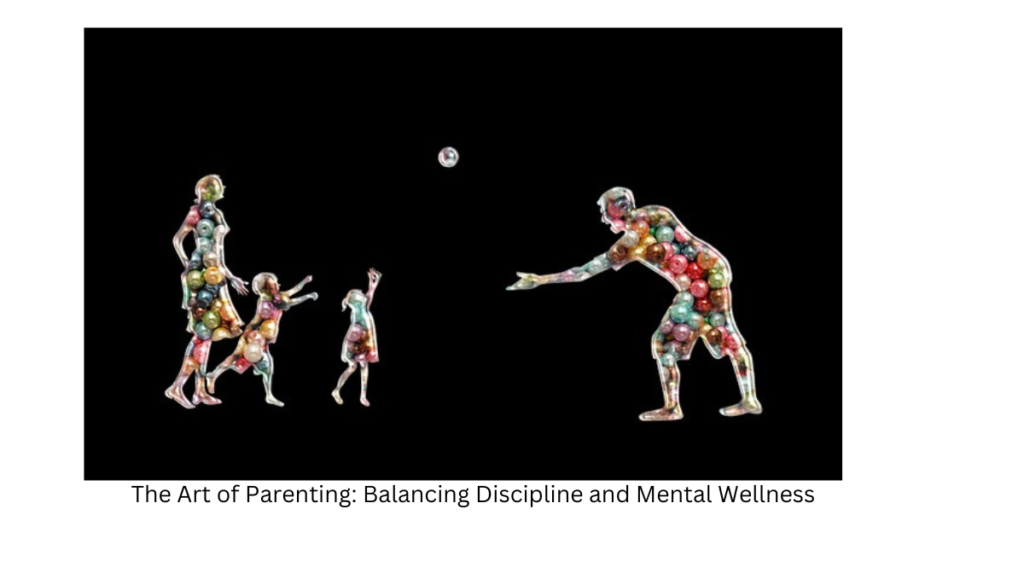Introduction: –
The Art of Parenting: Balancing Discipline and Mental Wellness

In the intricate tapestry of parenting, one of the most challenging threads to weave is the balance between discipline and mental wellness. While disciplining a child is essential for their development, ensuring their mental well-being is equally crucial. Striking this balance can be likened to an art, requiring patience, understanding, and a personalized approach to each child’s needs.
Understanding Discipline in The Art of Parenting
Discipline is not synonymous with punishment. Instead, it is a means of guiding and teaching children to make responsible choices and develop essential life skills. Effective discipline lays the foundation for a child’s moral and ethical development, helping them understand the boundaries of acceptable behavior.

The Importance of Setting Boundaries
One key aspect of discipline is setting clear boundaries. Children thrive in structured environments where they know the rules and expectations. These boundaries provide a sense of security and predictability, which are vital for their emotional well-being. However, it’s crucial that these rules are age-appropriate and reasonable. Overly strict or unrealistic expectations can lead to stress and hinder mental wellness.
The Role of Communication
Effective communication forms the heart of successful parenting. Encouraging open and honest dialogue with your child allows them to express their thoughts, feelings, and concerns. Such communication not only helps parents understand their child’s perspective but also fosters trust and a sense of security. When children feel heard and valued, they are more likely to cooperate with discipline measures and maintain good mental health.
The Power of Positive Reinforcement
While discipline often involves addressing negative behaviors, it’s equally important to reinforce positive ones. Celebrating your child’s achievements, no matter how small, can boost their self-esteem and confidence. Positive reinforcement encourages good behavior and contributes to a child’s overall mental wellness.
Leading by Example
Children learn by observing their parents and caregivers. Your behavior serves as a blueprint for their own actions and attitudes. To instill discipline and promote mental wellness, be a positive role model. Demonstrate empathy, resilience, and effective stress management techniques. By showcasing these qualities, you provide your child with valuable life skills that will serve them well in adulthood.
Encouraging Independence
Encouraging independence is another crucial aspect of parenting. Allowing your child to make age-appropriate decisions and take responsibility for their actions nurtures their self-confidence and critical thinking skills. While parents should offer guidance and support, allowing children to learn from their mistakes is essential for personal growth and mental resilience.
Prioritizing Mental Wellness
In the pursuit of discipline, it’s vital not to neglect a child’s mental wellness. Recognize the signs of stress, anxiety, or other emotional issues. Create a safe space for them to share their feelings without judgment. If necessary, seek professional help from therapists or counselors who specialize in child and adolescent mental health.
What is the gold standard of parenting?
There is no universally recognized “gold standard” of parenting, as effective parenting can vary significantly depending on cultural, societal, and individual factors. Parenting is a complex and multifaceted task, and what works best for one family may not be the same for another.

However, there are some common principles and practices that are often considered fundamental to effective parenting:
- Unconditional Love and Support: Providing children with love, emotional support, and a sense of security is considered one of the most important aspects of parenting. Children thrive when they feel loved and valued by their parents.
- Clear Communication: Open and honest communication between parents and children is crucial. This includes active listening, empathy, and encouraging children to express their thoughts and feelings.
- Consistency: Consistency in discipline and boundaries helps children understand expectations and feel secure. It’s important to establish clear and fair rules and enforce them consistently.
- Positive Reinforcement: Encouraging and praising good behavior can be more effective than solely focusing on punishment. Positive reinforcement helps build a child’s self-esteem and reinforces desired behaviors.
- Setting a Positive Example: Parents are role models for their children. Modeling kindness, respect, empathy, and other positive behaviors can have a profound impact on a child’s development.
- Adaptability: Effective parenting involves being adaptable and responsive to the changing needs of your child as they grow and develop. What works for a toddler may not be suitable for a teenager.
- Balancing Freedom and Responsibility: Gradually giving children more independence and responsibility as they mature helps them develop essential life skills and decision-making abilities.
- Education and Support: Staying informed about child development and seeking support when needed, whether through parenting classes or counseling, can be beneficial for both parents and children.
It’s important to recognize that there is no one-size-fits-all approach to parenting, and what works in one situation may not work in another. Effective parenting involves a combination of these principles tailored to the unique needs and circumstances of your family. Ultimately, the “gold standard” of parenting is providing a safe, loving, and supportive environment that nurtures a child’s physical, emotional, and intellectual development, helping them become responsible and well-adjusted individuals.
What are the 4 C’s of parenting?
The “4 C’s of parenting” is a concept that highlights four essential qualities or principles often associated with effective and nurturing parenting. These four C’s are:

- Consistency: Consistency in parenting involves setting clear and reasonable expectations, rules, and boundaries for your child and enforcing them consistently. Children thrive in an environment where they know what to expect and understand the consequences of their actions. Consistency helps provide structure and stability in a child’s life, contributing to their sense of security.
- Communication: Effective communication is crucial in parenting. It involves not only talking to your child but also actively listening to them. Encourage open and honest dialogue, where your child feels comfortable expressing their thoughts, feelings, and concerns. Good communication helps build trust and understanding between parents and children.
- Care: Care refers to the emotional support, love, and nurturing that parents provide to their children. Demonstrating care involves showing affection, empathy, and attention to your child’s emotional needs. When children feel loved and valued, they develop a strong sense of self-worth and emotional well-being.
- Control: Control, in the context of parenting, doesn’t mean strict authoritarianism but rather the appropriate exercise of authority and guidance. Parents should strike a balance between setting rules and allowing their children some autonomy. This balance helps children develop a sense of responsibility and independence while still benefiting from parental guidance and protection.
These four C’s represent key principles that contribute to healthy parent-child relationships and support a child’s overall development. Effective parenting often involves a combination of these principles, tailored to the specific needs and circumstances of the child and family.
Conclusion
Parenting is indeed an art, and the delicate balance between discipline and mental wellness is at its core. Every child is unique, and there is no one-size-fits-all approach to parenting. It requires patience, empathy, and a deep understanding of your child’s needs and personality. By fostering open communication, setting clear boundaries, practicing positive reinforcement, being a positive role model, encouraging independence, and prioritizing mental wellness, you can master this art. With time and effort, you can raise a well-rounded, emotionally resilient individual prepared to navigate the complexities of the world.





